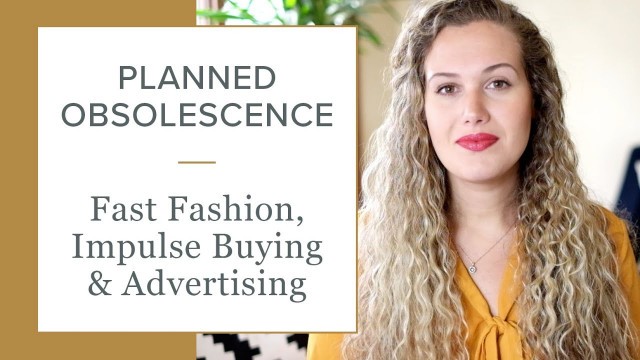

'They don’t make ‘em like they used to. Planned Obsolescence Industrial design of planning or designing a product with a limited useful life, so it will become obsolete (that is, unfashionable or no longer functional) after a certain period of time. Companies (across the board) do their best to get people to buy more things from them. Tech companies are notorious for forcing you to upgrade, but other companies also do their best to make things obsolete through fashion or function so you will upgrade and buy more from them. That\'s just how companies make money. That\'s why, planned obsolescence is here to stay. Planned Obsolescence plays a large part in why you are always buying new things. While minimising in life, it’s important to understand planned obsolescence and how to avoid it, to not be deceived and manipulated by companies and their products. Start buying with your eyes wide open, and only buy what is essential for your life. Many ways for a company to pan out planned obsolescence, but here are 3 major strategies. Fast Fashion - inexpensive clothing produced rapidly by mass-market retailers in response to the latest trends Fast fashion uses cheap materials to churn out clothing quickly at stores like H&M, Forever 21, and Target. Buying fast fashion often ends up costing consumers more in the long run, because not only are they made very cheaply and won’t last, but also because they deliver only trends that will go out of fashion fairly quickly which makes you then buy more trendier clothes soon after. This is planned obsolescence in fashion. Avoiding these stores and finding clothes that use high quality materials as well as classic staple pieces that could be worn for years without going out of style is key to not falling into the endless loop of fast fashion. Fast fashion is also used in home decor, and even appliances. But more on that in another video. Impulse Buying - the buying of goods without planning to do so in advance, as a result of a sudden whim or impulse. Take a look around your house and see all the unused items collecting dust. The gadgets in your kitchen cupboards, the exercise equipment in your garage, the unworn clothes in your wardrobe. You see a sale, a limited time offer, or a random trinket in a checkout line and you think if I don’t get it now, then I won’t be able to get it for a better price later. The truth is, this the retailer is using tried and true tactics to pressure you to buy without thinking. You can get that item somewhere else for the same of better price, if you really need it. If you are buying something you weren\'t planning to buy on sale, you are not saving money, you are impulse buying. Best way to avoid, make a list and stick to it. If you really want it, Wait 24 hours to buy it. Compare it online to other items like it for best quality. Tell yourself 5 ways that you will use that item Ask yourself, is this an item that I will use in 2 years? Ask yourself, do I already have an item like this? Advertising - Forever persuading you to buy new things Working in the advertising field, for advertising agencies and creating new advertising for clients myself, I can go on for a very long time about all the strategies used to make you discontent with what you have and go buy new things. It all boils down to, all advertising does is play on psychological insecurities and your emotions. Advertising will always create a perfect lifestyle that you can never attain, but can get closer to this perfect lifestyle if you purchase said item. Advertising plays out planned obsolescence to make you discontent with what you have and view it as out of date, or not good enough and then makes you want to buy another item that will make you look or live a nicer lifestyle. My weakness: Home magazines, I compare what I have to doctored up home magazines that were carefully designed just for that one magazine, make me discontent. Avoid commercials, magazines and shows that always focus on getting something new and trendy like HGTV or fashion shows. Notice how all these shows as sponsored companies like Lowe\'s or clothing brands.'
Tags: minimalism , advertising , shopping addiction , fast fashion , christian minimalist , christian minimalism , impulse buying , planned obsolescence , no-buy , no-buy year
See also:

















comments